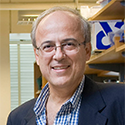Why should I become a chemical engineer?
Chemical engineers are, above all, problem solvers who seek to use their tools to help improve the world.
Many different types of employers seek the ChemE’s analytical and trouble-shooting skills, making chemical engineers extremely adaptable and highly sought-after in many fields. They are some of the most highly equipped to address key problems we face in climate, energy, sustainability, and human health. They are also deeply engaged in the integration of computation in addressing all of these problems.
Having a base in chemical engineering prepares you for any number of exciting and fulfilling careers in science, engineering, business, and policy.
To learn more about chemical engineering, go to:
- Ask Current ChemE Students
- AIChE Careers
- AIChE Students Chapter
- World Wide Learn – Chemical Engineering Majors Guide
- Princeton Review – Career Guide
 Chemical engineering enables us to translate our fundamental understanding of chemistry and biology into tangible improvements to people’s lives. – Prof. Ariel Furst
Chemical engineering enables us to translate our fundamental understanding of chemistry and biology into tangible improvements to people’s lives. – Prof. Ariel Furst
 Chemical engineering is the perfect backdrop for our research. We engineer microbes to produce chemical compounds. Some may look at this and think biology, but if you were able to peer inside a cell, you’d witness thousands of chemical reactions inside a microbial chemical factory. – Prof. Kristala Prather
Chemical engineering is the perfect backdrop for our research. We engineer microbes to produce chemical compounds. Some may look at this and think biology, but if you were able to peer inside a cell, you’d witness thousands of chemical reactions inside a microbial chemical factory. – Prof. Kristala Prather
 I chose chemical engineering because I wanted to tackle the world’s most challenging energy problems and I knew a ChemE degree would equip me with the tools necessary to make an impact. – Prof. Fikile Brushett
I chose chemical engineering because I wanted to tackle the world’s most challenging energy problems and I knew a ChemE degree would equip me with the tools necessary to make an impact. – Prof. Fikile Brushett
 Chemical engineering is the only engineering discipline founded on all three sciences, & mathematics. As such, it is well positioned for exploring discoveries and advances in chemistry, biology and physics to solve pressing problems in energy, the environment, biosciences, materials & other exciting areas. This makes ChE very relevant and also a lot of fun. – Prof. Gregory Stephanopoulos
Chemical engineering is the only engineering discipline founded on all three sciences, & mathematics. As such, it is well positioned for exploring discoveries and advances in chemistry, biology and physics to solve pressing problems in energy, the environment, biosciences, materials & other exciting areas. This makes ChE very relevant and also a lot of fun. – Prof. Gregory Stephanopoulos
 Chemical engineers are the key generators of most of the technology that forms the basis of modern humanity, including microelectronics, batteries, pharmaceuticals, biotechnology, biomedical devices, fuels, textiles, packaging, food and agricultural products, and environmental remediation. – Prof. Richard Braatz
Chemical engineers are the key generators of most of the technology that forms the basis of modern humanity, including microelectronics, batteries, pharmaceuticals, biotechnology, biomedical devices, fuels, textiles, packaging, food and agricultural products, and environmental remediation. – Prof. Richard Braatz
 Chemical engineering is essential for applying fundamental chemical insights to address grand challenges in climate and sustainability. – Prof. Yogesh Surendranath
Chemical engineering is essential for applying fundamental chemical insights to address grand challenges in climate and sustainability. – Prof. Yogesh Surendranath
 Chemical engineers have helped lead the incredible expansion in quantitative biotechnology and drug development, making groundbreaking discoveries in an exciting field that continues to evolve! – Prof. Brandon DeKosky
Chemical engineers have helped lead the incredible expansion in quantitative biotechnology and drug development, making groundbreaking discoveries in an exciting field that continues to evolve! – Prof. Brandon DeKosky
 One of the greatest challenges in understanding biological phenomena arises in integrating across multiple systems & time-scales. Chemical engineering equips students with the skills to understand biological systems across molecular & cellular scales and to engineer new functions driving innovations in biotechnology & medicine. – Prof. Kate Galloway
One of the greatest challenges in understanding biological phenomena arises in integrating across multiple systems & time-scales. Chemical engineering equips students with the skills to understand biological systems across molecular & cellular scales and to engineer new functions driving innovations in biotechnology & medicine. – Prof. Kate Galloway
 Chemical Engineering provides an intellectual framework & toolkit for addressing a tremendous range of societally-important problems today, and it is always open to adding new tools that will be needed for tackling the big problems of the future tackling the big problems of the future. – Prof. William Green
Chemical Engineering provides an intellectual framework & toolkit for addressing a tremendous range of societally-important problems today, and it is always open to adding new tools that will be needed for tackling the big problems of the future tackling the big problems of the future. – Prof. William Green
 Chemical Engineering provides the intellectual framework to take your molecular concepts from ideas to scalable solutions so they can transform lives, whether it’s inventing new ways to make medicines, improving our knowledge and treatments for human disease, innovating approaches for sustainable energy, or making advanced materials with tailored properties. – Prof. J. Christopher Love
Chemical Engineering provides the intellectual framework to take your molecular concepts from ideas to scalable solutions so they can transform lives, whether it’s inventing new ways to make medicines, improving our knowledge and treatments for human disease, innovating approaches for sustainable energy, or making advanced materials with tailored properties. – Prof. J. Christopher Love
 Chemical engineering designs a variety of macroscopic systems based on molecular understandings, integrating chemical, physical and biological principles to benefit health, energy, and environment.– Prof. Qin (Maggie) Qi
Chemical engineering designs a variety of macroscopic systems based on molecular understandings, integrating chemical, physical and biological principles to benefit health, energy, and environment.– Prof. Qin (Maggie) Qi
 We live in a material world, and molecules are its building blocks. For me, chemical engineering is the engineering of molecules, what they can do and what they can become. – Prof. Gregory Rutledge
We live in a material world, and molecules are its building blocks. For me, chemical engineering is the engineering of molecules, what they can do and what they can become. – Prof. Gregory Rutledge
 The ability to control molecules at the atomic length scale uniquely positions chemical engineers to tackle the grand challenges of our day in energy and the environment. – Prof. Zachary Smith
The ability to control molecules at the atomic length scale uniquely positions chemical engineers to tackle the grand challenges of our day in energy and the environment. – Prof. Zachary Smith
 A chemical engineering education provides powerful training in the foundational principles that underlie all energy conversion technologies, including transport, kinetics, and thermodynamics. – Prof. William Tisdale
A chemical engineering education provides powerful training in the foundational principles that underlie all energy conversion technologies, including transport, kinetics, and thermodynamics. – Prof. William Tisdale
 Chemical engineering is one of the broadest backgrounds one can have. It can enable you to work in so many areas – nanotechnology, materials, energy, medicine, and many others. And it can enable you to discover and invent things that can change the world. – Prof. Robert Langer
Chemical engineering is one of the broadest backgrounds one can have. It can enable you to work in so many areas – nanotechnology, materials, energy, medicine, and many others. And it can enable you to discover and invent things that can change the world. – Prof. Robert Langer

